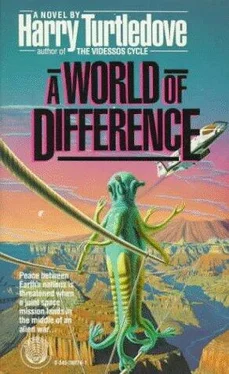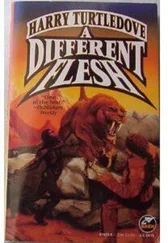“And I only do what my domain master orders of me,” the male retorted.
Tolmasov tried a new tack. “We show we Hogram’s friends many times, many ways. Why so angry now, at one small thing?”
In warmer weather, he would have been sweating. This- house arrest-would wreck the mission’s ability to gather data. He had the bad feeling Hogram knew that. Being manipulated by the natives was not something the pilot had anticipated; their technology was too primitive to let him think of them as equals. But that did not, worse luck, mean they were stupid.
For that matter, they knew more about humans than Tolmasov had suspected. “One small thing, is it?” the male said. “Then why did you conceal the fact that one of you is, of all the disgusting notions, a grownup mate? Did you know it would only make us reckon you more monstrous than we do already?”
“Not hide,’, Tolmasov insisted. He shared an appalled glance with Lopatin. They had known about Minervan females’ short lives for some time now and had slowly gotten used to the idea. This was not Earth. Expecting everything to work the same way would have been foolish. So, evidently, would have been expecting the Minervans to understand that. Tolmasov fell back on the only answer that might do some good. “No one ask us.”
“Ah, and so you said nothing. A merchant’s reply, we call that,” the male said. Relief flowed through Tolmasov; he had helped himself rather than hurt. But the male went on, “If you are merchants, too, you will see that we do what we must to make you deal as we want. When you do, all your privileges will be restored. Till then, you stay in here. Now go in.”
“How long we stay?” Tolmasov asked.
“Till you show us what we need to know. I told you that.
How long it is depends on you.”
“Cannot do what you want,” the pilot said.
“Then you’ll stay in there a long time,” the male answered.
“We don’t have the food to withstand a long siege,” Lopatin said, in Russian.
“We don’t have anything to withstand a long siege,” Tolmasov answered in the same language. That was-what was the fine American phrase? a self-evident truth.
“Go in now,” the Minervan male said, in no mood to let the two humans chatter away in a speech he could not follow. At his gesture, his followers raised their weapons. Short of opening fire, Tolmasov and Lopatin had no choice but to obey.
Inside the tent, Shota Rustaveli and Katerina had been listening to everything that was going on. Rustaveli greeted Lopatin with an ironic bow. “Good day, Oleg Borisovich, and welcome to the Gulag.”
“That’s enough from you, you Georgian-“ Lopatin growled before Tolmasov followed him in.
“That’s enough from both of you,” the pilot said sharply. “I cannot command us to like one another, but we will treat each other with respect, all the more so in this tight space. Think of it as spaceship discipline if you must.”
Everyone nodded. Then Katerina said, “Think of it as living in a two-room apartment with four generations of your family.” This time everyone laughed.
“Da,” Tolmasov said. He had lived like that himself. Everyone had lived that way in Smolensk when he was small, in one of the Stalin-Gothic apartment blocks that had gone up like ugly toadstools after the Great Patriotic War. Afterward, he had never thought those memories would be funny. Now he was grateful to Katerina for using them to break the tension of the moment.
“The resemblance will grow even closer when the chemical toilet clogs up,” Rustaveli said. He sounded sardonic as usual, but he looked serious. He was right, too. After a few days-a week, at most-with four people in permanent residence, the tent would be a decidedly unpleasant place to live.
“The heater will need another charge of gas before long, too,” Katerina said. “And the stove. Afterward, we’ll have no way to make tea, or to make our concentrates into hot food. Come to that, we may not even have water.”
Tolmasov grimaced. Maybe the Minervans would let them go out to gather ice and snow, maybe not. If not, the siege would end in a hurry.
“If the natives want our Kalashnikovs so badly, maybe we should give them a good taste,” Lopatin said. Then, before anyone could shout at him, he shook his head. “No, it would not do. Like it or not, we live in the age of media. Regardless of what a few well placed bullets might accomplish here, they would do more damage back on Earth.”
“Imperialism is easier when word of what it takes to build an empire never leaks out,” Rustaveli said. “Georgia has learned that all too well, from underneath.” For a moment, the brooding expression in his dark, hooded eyes, the way the shadows sat on his narrow cheeks, made him seem almost as alien to the three Great Russians in the tent with him as did the Minervans outside.
A real fight might have sprung from his words. Maybe he intended that. Just then, though, a Minervan called, “Sergei Konstantinovich, come out, please. Come alone.” He spoke Russian.
“Fralk,” Tolmasov mouthed silently. Not seeing what other choice he had, he went. “Zdrast’ye, “he said somberly. “What do you aim to do with us?”
“Do with you?” Fralk returned to his own language. He sounded altogether innocent, a good enough reason, Tolmasov thought, to suspect he wasn’t. “Nothing at all. We will merely keep you here and at your skyboat.”
His pause, again, was perfectly-too perfectly-contrived. “The machine that goes back and forth between here and your skyboat may continue to do so… provided it goes by the same route it always uses. Other than that, you humans may not leave the skyboat, either. Males are on the way to enforce Hogram’s command there.”
“Thank you for letting us eat and stay warm, at any rate.”
Tolmasov did his best to stay polite. He was seething inside. Sure enough, the locals had spotted the humans’ weakness. Being on Minerva without exploring was like sharing a bed with a beautiful-and expensive, oh so expensive trollop without making love.
“We have no wish to harm you humans in any way,” Fralk assured him. “As you know, I owe you my life. But Hogram, wanting many other males to be preserved thanks to your rifle, can no longer cooperate with you when you do not cooperate with us.”
“You should write for Pravda,” Tolmasov muttered, which meant nothing to Fralk. But the Minervan was doing a good job of reproducing the more-in-sorrow-than-imagine, it’s-for-your own-good tone the paper often took. The pilot went on. “My domain masters-”
“Are far away,” Fralk interrupted. “Hogram is here, and so are you. You would do well to remember it.”
Tolmasov waved at the spear-carrying males. “Hard to forget.”
“Think of them as being here to protect you, if you like,” Fralk said.
Tolmasov did not know how to say “hypocrite” in the Skarmer tongue, and Fralk did not understand the Russian word. The conversation, accordingly, lagged. Tolmasov went back into the tent. Fralk’s voice pursued him. “Think on what you do, Sergei Konstantinovich.”
“Bah!” The pilot flung himself into the chair in front of the radio. He worked off some of his fury by profanely embellishing the warning he sent to Bryusov and Voroshilov in Tsiolkovsky.
After the sparks stopped shooting from Tolmasov’s mouth, the two men on the ship did not reply for some little while. At last, timidly, Valery Bryusov asked, “Do I understand that you want us to obey the Minervan males when they arrive?”
“Yes, curse it,” the pilot growled. “If they keep letting the rover travel back and forth, I don’t see what else we can do. We cannot fight them unless they attack us first-as Oleg Borisovich has said, public opinion back home would never support it. We will just have to see just who can be more stubborn, us or the Minervans.”
Читать дальше












